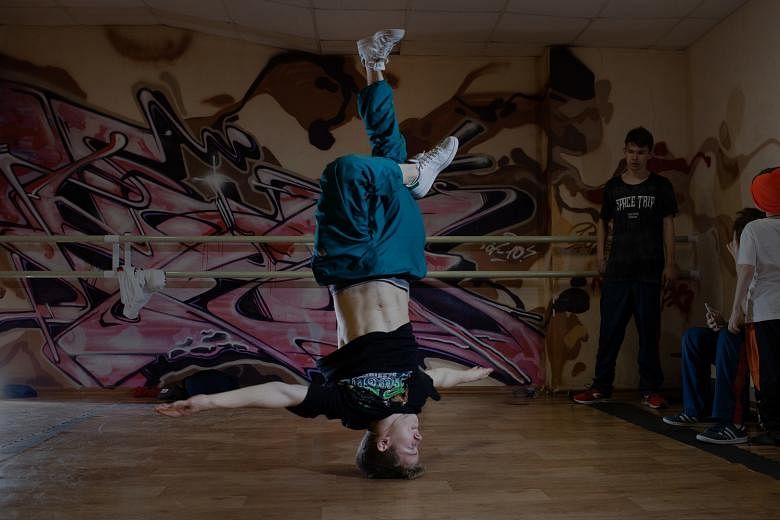VORONEZH (Russia) • Russian break-dancers these days, they do not know how easy they have it.
Sergey Chernyshev, 39, was reminiscing about starting out as a young B-boy in Voronezh. That was in the mid-1990s, before the Internet shrank the world and the city still seemed a universe away from the wellsprings of hip-hop culture.
"Someone would get a tape from abroad, and we would make copies," Chernyshev said of VHS tapes that trickled in from the West.
"We would take something from one video, another piece from another video, and that's how we learnt how to dance."
Things have changed considerably, a point Chernyshev can illustrate today just by pointing to his 18-year-old son, also named Sergey, who break-dances under the moniker Bumblebee.
Last year, Bumblebee won the gold medal for boys at the first Youth Olympic break-dancing event, solidifying his standing as one of the more promising young breakers in the world.
When it was announced this year that break-dancing would be added to the programme for the 2024 Summer Olympics in Paris, Bumblebee suddenly had a new life goal.
In many ways, the story of the Chernyshevs, father and son from Voronezh, a former manufacturing hub of around one million people, is the story of break-dancing over the past three decades - with its unlikely journey from New York to every corner of the globe and to its surprising inclusion, pending a final vote in December, in the Olympics.
Bumblebee himself embodies a new kind of aspiring Olympian, excelling in the sort of niche, non-traditional sport that the International Olympic Committee has recently promoted: surfing, skateboarding, rock climbing and kiteboarding.
He has spent half his life breaking, with a style and a skill set nurtured by streaming video and social media, feeling every bit a part of, and protective of, hip-hop culture - a culture that has room, in his mind, for the Olympic Games.
"I want to make it," Bumblebee said. "And I want to win."
Michael Holman, 64, who founded the dance crew New York City Breakers, had always viewed the Olympics as a sort of promised land for break-dancing.
A book he published about his crew in 1984 included a proclamation, signed by the members of the group, that read: "We see break-dancing as a future Olympic sport and ourselves as pioneers in making this dream a reality."
It was a sentiment some found absurd. To the Breakers, it made perfect sense.
"Competition is the basis of all hip-hop culture," Holman said in a recent interview. "The breakers battled: Who had the best moves?"
Throughout the 1990s, Chernyshev organised battles in Voronezh, at dance clubs and at a karate school that had a spare room.
In 2009, he opened a school called Infinity Dance Studio. His son, then nine, was among his first students.
On a recent morning, a dozen young children wearing baggy T-shirts and tracksuits were scattered around a mirrored room in the studio, cavorting on the floor and spinning on their heads. Bumblebee knelt close by, offering tips.
When the class ended, Bumblebee cranked the stereo to a deafening volume and practised some moves of his own.
He was nursing a sore hand, but his athleticism and blossoming swagger were evident. In many ways, he seemed a typical teenager, one who can walk and talk and shoot off a stream of text messages from his phone at the same time. But he could also sound like a grizzled professional.
"I don't understand parents," he said at one point, referring to the low turnout of students over the holiday weekend. "When I was these kids' age, I was here every day, for six hours, alone, all summer."
He continues to dance for hours every day. But now he supplements those sessions with workouts in the gym and swimming in a pool.
He goes to bed early, wakes up early and avoids sweets. In important ways, it is a disciplined lifestyle as demanding as that of any other serious young athlete or aspiring Olympian.
Still, Bumblebee said repeatedly that break-dancing was not a sport but an art form. Sure, it requires physical strength and coordination, he said, but it requires much more than that, too.
"It's about feeling, and without this feeling, without this sense of art, you can't do anything," he said.
"And you can't get that feeling if you're not part of the culture, if you're just doing the moves."
NYTIMES

